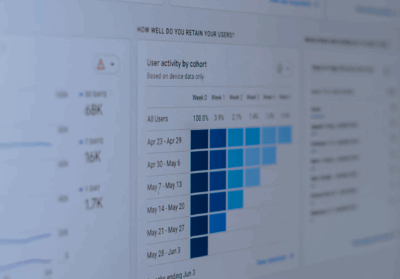5 Questions worth asking yourself before investing in AI Search Optimization
We tackle 5 strategic questions you may be asking now – when digital visibility means being part of the conversation, not just showing up in traditional search results.

Until recently, digital visibility meant ranking well on Google. That’s no longer the whole story. With language models like ChatGPT, Claude, Perplexity, and AI Overviews shaping how users get answers, people now get summaries, insights, and advice without ever clicking a link.
In practice, this means that:
- SEO is evolving into something new.
- Visibility now includes being present in AI-generated content.
- Companies need to think beyond Google and into the world of language models.
Recent research (Semrush, 2025) suggests that by 2028, AI-driven search could surpass traditional SEO traffic. And the transition is already underway.

AI Search Optimization – a new layer in your digital strategy
AI Search Optimization ensures that your brand is visible in AI-generated answers. Unlike traditional SEO, which emphasizes rankings and clicks, this approach focuses on:
- Citations – even if there’s no direct link.
- Writing content that’s clear and usable for language models.
- Having a presence in the data sources LLMs rely on, such as Reddit, Quora, and industry publications.
Beyond that, AI Search also involves:
- Developing a strategy to feed information into AI systems.
- Structuring content so it can be processed semantically.
- Using formats that are easy for LLMs to interpret – such as tables, bullet points, and clearly labeled sections.
- Ensuring consistent brand representation where AI learns and sources knowledge.
It’s an evolution of SEO that merges content marketing strategy, technical SEO, semantic analysis, and the knowledge of how language models operate.
If you want to better understand how these systems work, we recommend other articles from this series:
Behind the algorithms: how AI chatbots recommendations work
The complete guide to AI search platforms
Understanding llm.txt: controlling AI search visibility
Why is this important for your company?
Traditional SEO remains important, but it’s no longer sufficient on its own. AI-driven search is now a critical component of brand positioning, shaping:
- How audiences perceive your brand,
- Every stage of the customer decision-making process,
- Visibility at key moments along the purchase journey.
Businesses that start asking the right questions today can secure a long-term competitive edge – before the market becomes oversaturated.
5 key strategic questions before investing in AI Search Optimization
Implementing AI Search Optimization is a strategic decision, affecting visibility, brand positioning, and ultimately – sales and company growth. Before taking action, it’s worth answering yourself, or with your team, a few significant questions.
Q1: How much is AI changing user behavior and the search market?
Just a few years ago, a user would type a query into Google, scan the list of results, compare websites, and only then make a decision. Today, more and more often, that decision-making process is completed within a single AI-generated answer – without any clicks.
Solutions like ChatGPT, Google AI Overviews, Gemini AI Mode, Claude, or Perplexity are creating a new way of accessing information by providing:
- Conversational interfaces,
- Instant and structured answers,
- No need to visit websites,
- Often: no or minimal source links.
Studies from Semrush (2025) and BrightEdge (2024) have found that:
- 60–70% of Google queries now end without a click (“zero-click”),
- AI-generated answers reduce CTR by 30–70%,
- Users become used to a new behavioral pattern and discover that they can reach a purchasing decision or get a recommendation without going through traditional websites.
What does this mean from a business perspective?
Your website might show up in search results – but that doesn’t guarantee the customer will see it. AI can pull fragments of your content to generate answers, often without linking back to the source. This practice is known as an implicit citation.
Your competitor may be recommended as the optimal solution for your customer – without your brand even appearing as an alternative. AI models have limited “context windows.” If your competitor has a stronger semantic signal (e.g., citations, presence in sources like Reddit/Quora), their name will be more likely to appear in the answer than yours.
Even with a website perfectly optimized for traditional search engines, and a well-thought out buying process implemented in your store, your impact on the customer’s purchasing decision may be smaller than it used to be.
Large Language Models (LLMs) don’t operate like traditional search engines – they generate responses based on learned patterns, not on top-ranked Google results.
AI is changing the logic of user behavior
It no longer matters who ranks first in search results – what matters is whether you are in the answer. You’re no longer competing for a click – you’re competing to be part of the conversation between the user and AI. That’s why content quality, message clarity, and semantic consistency of your brand become more crucial than ever before.If you’ve been thinking of SEO as a “game with Google’s algorithm” – it’s time to zoom out. In AI Search, the winner isn’t the one who best “optimizes keywords.”
The winner is the one whose content is understood, remembered, and referenced by AI. If you don’t know whether your brand is present in AI-generated answers – you’re already a step behind the competition.
And this isn’t about ranking in the classic SERP. It’s about whether:
- Your brand is recognizable to language models,
- Your content is chunkable – that is easy-to-use by AI in its responses,
- You appear in all the places where LLMs look for information.
This is a question of visibility, trust, and the future of your brand in a world where AI is becoming the first, and often the last, source of information that helps make decisions.

Q2: What business goals can AI Search Optimization support in our company?
Implementing AI Search Optimization is not just a response to changing algorithms. It’s a conscious use of new channels for appearing exactly where the user’s attention is and strengthening your impact on their decisions – before your competitors do.
Just as SEO has supported goals like lead generation, sales, brand awareness, or expert positioning for years, AI Search can – and should – be as well a part of achieving strategic goals.
Main goals AI Search Optimization can support:
Increasing brand visibility in new search environments
Your brand can appear not only in classic Google results but also in AI-generated answers from ChatGPT, Claude, or Perplexity – as a recommendation, example, citation, or direct answer. In the “zero-click” era, this is the only way to be visible right where decisions are made.
Strengthening trust and influencing purchase decisions
AI-generated responses are perceived by users as neutral, credible, and “agenda-free.”
If your brand becomes a part of an AI-generated answer – it gains authority and an advantage before the user even gets to comparing offers.
Building presence in key moments of the customer journey (AI-led funnel)
AI models are used at every stage of the purchase journey:
- from initial research (“what types are there?”),
- through comparison (“what’s better: X or Y?”),
- to direct recommendation (“best X provider in 2025”).
This means AI Search Optimization can become a leading tactic in content marketing – as it allows you to guide the users towards specific solutions faster and more efficiently.
Increasing the value of traffic – not just the volume
According to data from Semrush, users coming from AI Search convert on average 4.4 times better than users from traditional organic search. Why? Because they’ve been exposed to context, are familiar with your offer, and were convinced by AI acting as a “trusted third-party advisor.”
Q3: What are the risks of ignoring AI Search Optimization?
In many organizations, AI Search Optimization is still treated as a “futuristic topic” to be taken care of when the time is right. Yet, the greatest risk lies in lack of action.
AI-driven search is already reshaping brand visibility, recognition, and customer acquisition. Language models don’t wait for your business to be ready – they generate answers based on the data they have right now.Our latest report on AI in Search and Shopping (2025) reveals that 77% of consumers already use AI tools on a regular basis, and 50% place at least equal trust in AI as in traditional search engines. The numbers show that consumers are already treating AI chats as a part of their search routine – it’s not a matter of future. The future is now.

What can happen if you ignore AI Search Optimization?
Disappearing from the users’ radar
AI models don’t show a list of results. Instead, they generate one best-fitting answer. If your brand isn’t found in the data the model deems valuable – you simply won’t appear. You won’t be rejected. You’ll be overlooked.
Conceding the field to the competition – for a long time
LLMs, unlike Google, don’t react instantly to website updates. They learn from content patterns over time. That means brands that feed the models with their content earlier may be favored for months or even years. Catching up later may be significantly harder.
Decreased effectiveness of traditional SEO
Even if you maintain high rankings on Google, users may not click – because they already saw the answer (e.g., in AI Overview). What used to be your strongest asset (position 1–3) may no longer carry the same value.
Losing influence over purchase decisions
If you’re not present in AI-generated answers, you’re not a part of the customer’s conversation. And that means you have no impact on how they perceive your brand, their comparisons, preferences, or final choice.
These are not future concerns. They’re already happening:
- Google is rolling out AI Overview and AI Mode, which in many cases decreases the significance of traditional search engine results.
- ChatGPT generates answers that include product and brand recommendations.
Lack of presence in AI Search is now a strategic risk – not just a marketing issue.
From a business owner’s or executive’s perspective, AI Search should be treated as:
- a new channel for influencing customers,
- a new source of brand reputation and authority,
- a new arena for competitive rivalry.
Just like with social media a decade ago – those who “wait” are left behind. The question is no longer: “Will AI Search take off?”
The real question is: “Will your company be present in this ecosystem – before it’s dominated by others?”

Q4. Do we have resources, or a partner, to guide us through this process?
AI Search Optimization might seem like the next logical step in the evolution of SEO – but in reality, it demands an entirely new skill set, toolset, and strategic mindset. And that’s what many companies don’t have. As a result, they simply postpone the topic due to lack of preparation.
From an executive or business owner perspective, the question is:
Can we handle this internally – or do we need a partner to lead us through the transition?
What does “implementing AI Search Optimization” really mean?
It’s not about kickstarting a single content campaign or installing a “new SEO plugin.” It’s a strategic process that includes:
- Auditing your brand’s current visibility in generative systems (does AI even “know” about us?),
- Identifying the list of topics you want to be cited in,
- Transforming content into formats understandable to LLMs (semantic optimization, structure),
- Placing company knowledge right where the models will find it,
- Monitoring citations and brand presence in AI responses.
This all requires a combination of skills from multiple areas:
- SEO and content marketing,
- Knowledge of LLM mechanisms and AI tools,
- Understanding of semantic language and data technology,
- Strategic thinking about the brand and customer journey.
Most companies don’t have these skills in-house – and that’s okay.
This is not the time to “rush-hire” an LLM optimization team.
It’s time to ask:
Do we have a partner who understands both SEO and AI – and can turn that into business value for our company?
A good partner will:
- Perform an audit of your potential and gaps,
- Build a realistic action plan,
- Explain things clearly instead of overwhelming you with jargon.
AI Search is too new, too dynamic, and too important to become a field for improvisation. It’s a new influence channel that deserves its own approach and quality control. The worst thing you can do is ignore it – or hand it off to a random “AI-friendly content” provider.
Conclusion:
If you don’t currently have AI Search capabilities in-house – don’t try to force them.
Find a partner who understands how the new search ecosystem works – and who can secure your visibility within it.

Q5. Is this the right time to invest in AI Search Optimization?
Many companies are aware of the upcoming changes, but postpone the decision, hoping that “there’s still time”, or thinking “let’s wait until the market matures.”
Meanwhile, AI Search is already working, and it already influences:
- What the user sees,
- Whom they trust,
- And based on which content they make decisions.
Why now?
Because first-mover advantage matters most.
Language models learn from existing data. If your content – or content about your brand – enters their “awareness” earlier than the competition’s content, you have a chance to become their default choice. What gets encoded today may be recalled by AI for months or years.
Because the competition hasn’t yet dominated the market.
Unlike in traditional SEO, in AI Search there’s still relatively little competition. Most companies don’t know how to operate in this world – let alone how to stand out. It’s the best moment to build visibility “from scratch” – before the place gets crowded.
Because the effects of actions in AI Search are cumulative.
AI does not learn overnight. If you publish content today – it does not guarantee that you’re visible tomorrow. LLMs need time to “absorb” data, learn it, and start recalling it. The earlier you start, the sooner you’ll enter the models’ knowledge ecosystem.
Because losing users’ attention can be hard to recover from.
Users are getting used to a shorter path – AI answer = decision. If your competition secures dominant presence in the AI tools’ responses before you, it will be much harder for you to displace them.
This isn’t a question of technology. It’s a question of strategic timing.
- Do you want to be the brand AI recommends?
- Do you want to be visible where the user makes the decision, not just where they “search”?
- Are you ready to invest in a new area that’s already changing how entire industries operate?
- And, do you want to do this before everyone else does?
If the answer is: yes – this is the right moment.
Waiting another year means:
- a more difficult entry,
- more competition.
Companies that start now will gain a real visibility advantage in the new search ecosystem – not for a week, but for years.
Summary: AI Search is a new layer of SEO. And it shouldn’t be ignored.
AI Search Optimization is not a passing trend. It’s a logical and inevitable evolution of SEO, stemming from the changing way of how web users search for information and make decisions.
Language models like ChatGPT, Claude, Perplexity, Gemini:
- don’t replace Google – but change its role,
- don’t show results – they show answers,
- don’t lead to a page – they lead to a solution.
Companies that want to remain visible, influential, and competitive must expand their approach to SEO today. Not to “rebrand” – but to secure the future of their online presence.
What’s next?
If you’re still not sure today:
- whether your brand is visible in AI,
- whether your content is understandable to language models,
- whether your SEO strategy reflects users’ changing habits…
…we’re here to help you with that.



